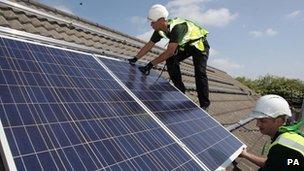CBI criticises solar subsidy cut
- Published

The government said the changes would ensure the scheme carried on in future.
The UK's biggest business group has criticised the government's decision to halve the subsidies for household solar electricity by next month.
Under the scheme, people in Britain with solar panels are paid for the electricity they generate.
The CBI said the decision to halve "feed-in tariffs" earlier than planned would force companies to cancel planned work, destroying projects and jobs.
The government said the changes would ensure the scheme carried on in future.
The new tariff of 21 pence, down from the current 43p, will take effect from 1 April and be paid to anyone who installs their solar system after 12 December.
The tariff for surplus electricity exported to the national grid will remain at 3.1p per kilowatt-hour.
CBI director general, John Cridland said the cut was the latest in a string of own goals by the government.
He said it had already turned the carbon reduction commitment incentive scheme into "a pure revenue-raiser" and taxed North Sea oil and gas.
In a speech to the CBI East Midlands annual dinner he said: "Moving the goal posts doesn't just destroy projects and jobs, it creates a mood of uncertainty that puts off investors and they wonder what's coming next.
"Some companies have invested heavily in solar photovoltaic systems and in the supply chains needed to install them.
"That commitment has been undermined by the feed-in tariff decision - and so industry trust and confidence in the government has evaporated. This bodes poorly for investment in future initiatives."
Legal challenges
He called for an industrial policy that helps the UK expand its share of the low-carbon sector, which he said had been growing globally throughout the recession.
Labour's shadow environment secretary Caroline Flint told the “óĻó“«Ć½ the government was in danger of killing the renewables industry.
"If you keep moving the goal posts around and make changes in haste, then the danger is that people don't have confidence and they don't invest.
"And it worries me that in just a year, we have gone from third place to 13th place behind Brazil and India in terms of investment in renewables and this is an industry - the solar industry - which has been hugely successful: 25,000 jobs, 39,000 if you add in the ones in the supply chain, that is being put at risk," she said.
The government's decision has already been criticised by the Local Government Association, which warned it would cost councils who had attempted to roll out the technology to poorer households hundreds of millions of pounds.
The Department of Energy and Climate Change is also facing two possible legal challenges over the plans from Friends of the Earth and lawyers acting for installers.
A DECC spokeswoman said: "We appreciate this will be difficult for companies affected but what we want is an enduring future for the industry.
"If we left things as they are, the feed-in tariff budget would be eaten up entirely, full stop, and that would be even worse for employees in this sector and those working on other technologies too.
"We believe solar photovoltaic can have a strong and vibrant future in UK and we are proposing changes to ensure a lasting feed-in tariffs scheme to support that future."